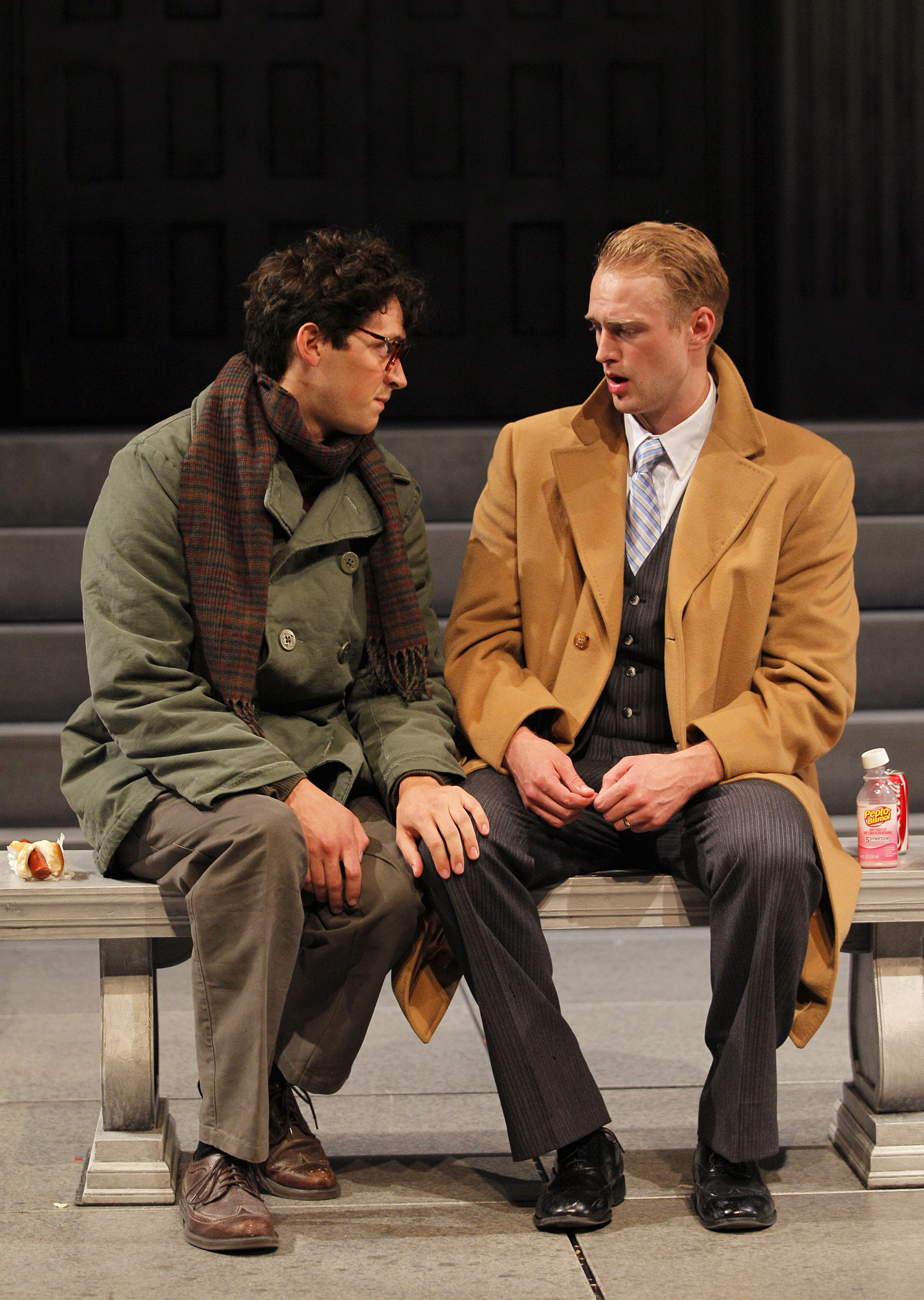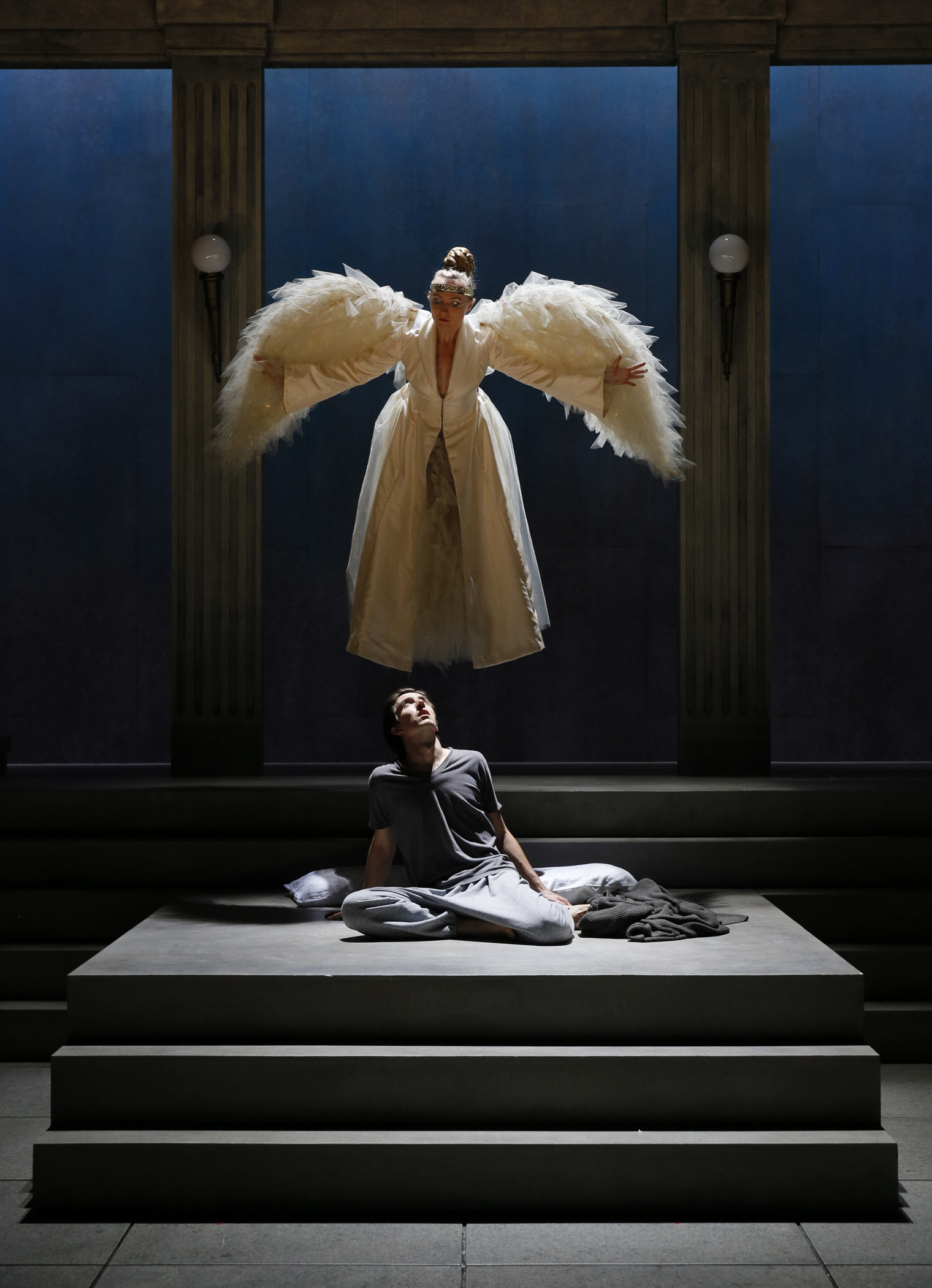In the early ’90s, Angels in America—Tony Kushner’s two-part, Pulitzer Prize-winning tale of lost souls—grabbed the theater world by its throat, mind, and heart, wrestling it into devotion. Nothing like it had been seen onstage: a merging of political fire, historical insight, camp humor, glittering cosmology, and ridiculously poetic writing. But then, the play arrived just a handful of years after Angels’ mid-’80s setting, when “living with AIDS” was an oxymoron. All gays were suspected carriers; political attacks were expected; and the fear of touching leftover plates and cups was commonplace. Those first performances took place in another world, 20 years before Intiman’s current revival. Gay couples had practically no rights, and AZT, a poison, was still the only treatment option for a disease the previous American president could hardly be bothered to say aloud.
And today? After so many cultural, legal, and medical breakthroughs, can Angels—with Part II, Perestroika, opening Friday to alternate with Part I, Millennium Approaches—still soar and thrill, achieving something both inspiring and divine?
Well, almost. Yes. Mostly. At a different speed, but still at a breathtaking altitude, maybe? (Or vice versa. The play begs for ethereal metaphors, but considering the bar Kushner sets for those, it’s crazy to try.) Part I contains a tragic story of longing and failing that gains universality by rooting itself firmly in the specifics of 1985 New York City. (“The urgent now,” Kushner insists.) Young Prior (a funny, high-pitched Adam Standley), beginning to develop telltale lesions, is abandoned by his lover, the left-wing, neurotic Louis (Quinn Franzen), who’s frightened by the failings of human flesh. Meanwhile, housewife Harper (Alex Highsmith) dissembles when her husband Joe’s (Ty Boice) same-sex desires belie his Mormon beliefs.
Prepare! Kaminski and Standley in Millennium Approaches. Photo by Chris Bennion
When Prior’s fever dream interlaces with Harper’s hallucination, the play’s magical possibilities begin: “This is the very threshold of revelation sometimes. You can see things,” says Harper. In the real world of the early ’90s, Angels created a similar setting for heightened insight—of the zeitgeist, as many critics said: the exact mix of confusion, stress, greed, and anticipatory dread of those plague years.
And it still does, though the shock of recognition for those initial audiences has been muted by the decades, if not silenced. Angels has become a history play, part of the living now insofar as new, young viewers (students?) are willing to connect it with their contemporary lives. Angels is still an AIDS play—though also much more than that—that we experience differently today.
Perhaps realizing that changed context, director Andrew Russell, past protege of the author, wisely stages a respectful, faithful production, knowing that a major reinterpretation would be unnecessarily indulgent. The text stands, and the new millennium gives us a changed perspective on it. “Responsibility; that’s a trap, too… Life is full of horror; nobody escapes, nobody. Save yourself,” says closeted former Cold Warrior Roy Cohn (Charles Leggett, shrewdly embodying a calm, unctuous Cohn rather than the usual Pacino-esque hysterics). That ruthless credo of individualism, conceived in the Reagan era, now echoes more strongly in the glib libertarianism of Rand Paul (by way of Ayn Rand).
Now more than ever, this is history worth remembering. (Just listening to a young man ask “Who was Ethel Rosenberg?” during a Part I intermission makes it seem like high time for reminding.) “Pretty soon . . . all the old ones will be dead,” says Rabbi Chemelwitz (Anne Allgood) during the play’s opening moments. After seeing the great playwright, activist, and ACT UP founder Larry Kramer onstage last week for The Normal Heart at the Emmys, frailty silencing him when nothing else could, we’re reminded just how few of the crisis’ survivors, that first generation, are left.
Again: context. Like HBO’s Angels miniseries in 2003, its faithful Heart adaptation—directed by Ryan Murphy—will be the CliffsNotes future theatergoers bring with them to revivals. (If a standing ovation is a show’s breakthrough moment, a movie is its saturation point—how it’ll be forever remembered.) Throughout Millennium Approaches, my plus-one kept whispering, “That’s Meryl Streep, right? And Emma Thompson?” whenever the talented Allgood and the wonderful Marya Sea Kaminski, respectively, appeared in their many roles.
I guess the similar, dual success of Heart and Angels is why some viewers and reviewers insist on comparing these deeply different works, to the detriment of both. Heart, a straightforward battle cry, is as direct and forceful as a baseball bat to the jaw, as Kramer intended. With no interest in complexity or in transcendence, it’s nothing like Angels, which, layered with Kushner’s waves of ideologies and myth, isn’t subtitled “A Gay Fantasia on National Themes” for nothing.
Heart’s fearless, unyielding protagonist Ned, a stand-in for Kramer, is perhaps more appealing to some than the terrified, scrambling Prior. But the wretched, honest vulnerability displayed by the gay men in Angels—Prior, Joe, Louis, Belize (Prior’s drag-queen nurse), and even Cohn—is part of their very humanity; what some might call weakness is revealed to be deeply, bravely political.
It’s a curious critical prejudice to force comparisons within the gay canon, insisting on the “heroic,” as if we’re allowed to tell stories only within strict, approved parameters to soothe our current political ideals. It’s like complaining that Death of a Salesman should’ve ended with Willy fighting the system, or that A Raisin in the Sun would’ve been better with a more defiant, Malcolm X-style protagonist.
But back to Kushner and the coming Perestroika, which—on the strength of Millennium Approaches—I recommend you see. How should we assess Kushner’s whole Angels enchilada? In the year 2014, with 25-year-and-longer HIV survivors and antiretroviral drugs, the possibility of immunotherapy, and pre-exposure prophylaxis, does the play have the same force? With gay marriage legal in this state and national polls tipping toward equal rights?
No, of course not. And we should all be thankful! If history hasn’t cracked wide open, at least a thousand hairline fissures—this play itself being one of the deepest and most moving—have transformed the landscape, and we live better now because of it. “The world only spins forward,” as Prior says. Because of the very changes Angels helped create, Kushner’s onetime call-to-arms now feels like a beautiful period piece, with all its poetic glory intact. Sure, it’s a little dated, but it’s also still topical—and maybe that’s the definition of a classic. Angels in America, Cornish Playhouse, 201 Mercer St. (Seattle Center), 441-7178. $25 and up. Runs through Sept. 21. See intiman.org for complete schedule.
stage@seattleweekly.com





